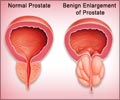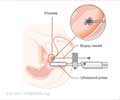Clin. Chim. Acta
Advances in prostate specific antigen biosensors-impact of nanotechnology.
Negahdary M, Sattarahmady N, Heli H
Prostate cancer is one of the most dangerous and deadly cancers in elderly men. Early diagnosis using prostate-specific antigen (PSA) facilitates dise ...
Read More
Source: PubMed
Am. J. Clin. Pathol. 2020 Jan 31
Prostate-Specific Antigen Test Utilization in a Major Canadian City.
Wang Q, Chen F, Jiang D, Kabani A, Sokoro AAH
To review the utilization of prostate-specific antigen (PSA) testing in Winnipeg, a major Canadian city, and to compare PSA testing rates between Winn ...
Read More
Source: PubMed
Niger Postgrad Med J
Lower urinary tract symptoms in patients with advanced prostate cancer: What are the outcomes of androgen deprivation therapy?
Akpayak IC, Shuaibu SI, Ofoha CG, Dakum NK, Ramyil VM, Onowa VE, Agbo CA, Nabasu LE, Galam ZZ
Androgen deprivation therapy (ADT) is accepted as the first-line treatment of advanced prostate cancer. This study sets out to determine the outcomes ...
Read More
Source: PubMed
Cancer Control
Geographic-Level Association of Contemporary Changes in Localized and Metastatic Prostate Cancer Incidence in the Era of Decreasing PSA Screening.
Yang DX, Makarov DV, Gross CP, Yu JB
Decreased prostate-specific antigen screening since 2008 has generated much concern, including report of recent increase in metastatic prostate cancer ...
Read More
Source: PubMed
Minerva Urol Nefrol 2020 Jan 29
Incidental prostate cancer after transurethral resection of the prostate: analysis of incidence and risk factors in 458 patients.
Porcaro AB, Tafuri A, Inverardi D, Amigoni N, Sebben M, Pirozzi M, Processali T, Rizzetto R, Shakir A, Cerrato C, Tiso L, Panunzio A, De Michele M, Brunelli M, Siracusano S, Artibani W
To evaluate the incidence and risk factors of incidental prostate cancer (IPCA) in a contemporary cohort of lower urinary tract symptoms (LUTS) patien ...
Read More
Source: PubMed

![Prostate Specific Antigen [PSA] & Prostate Cancer Diagnosis Prostate Specific Antigen [PSA] & Prostate Cancer Diagnosis](https://images.medindia.net/patientinfo/1920_500/prostate-specific-antigen.jpg)








